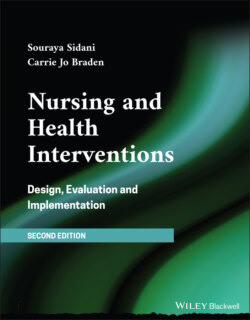Читать книгу Nursing and Health Interventions - Souraya Sidani - Страница 23
1.6 ADVANCES IN INTERVENTION RESEARCH METHODS
ОглавлениеThe increasing demand for addressing questions of relevance to practice (Chavez‐MacGregor & Giordano, 2016; Concato et al., 2010) and mounting evidence dispelling misconceptions about the strengths of the RCT and the weaknesses of non‐RCT or observation designs (Frieden, 2017) have brought to the forefront the importance of the research questions or aims in informing the selection of research designs and methods in intervention research (Skivington et al., 2018). Accordingly, researchers have a more inclusive range of research designs and methods to choose from. Designs considered appropriate for evaluating health interventions are presented in several publications (e.g. Medical Research Council guidance, 2019; Shadish et al., 2002; Sidani, 2015). The main categories of designs and methods are described in Chapters 14 and 15, respectively. The overall trend is toward embracing a pragmatic, realist approach to intervention evaluation research that is conducted within the context of practice and reflects the complexity of inter‐relations among client, health professional and contextual factors, intervention implementation, and outcomes. Practical trials, preference trials, adaptive designs, and multiple or mixed‐methods designs are relevant methodological innovations. The selection of a research design should be informed by the research questions, taking into consideration feasibility, ethical and safety issues (Lobo et al., 2017).
